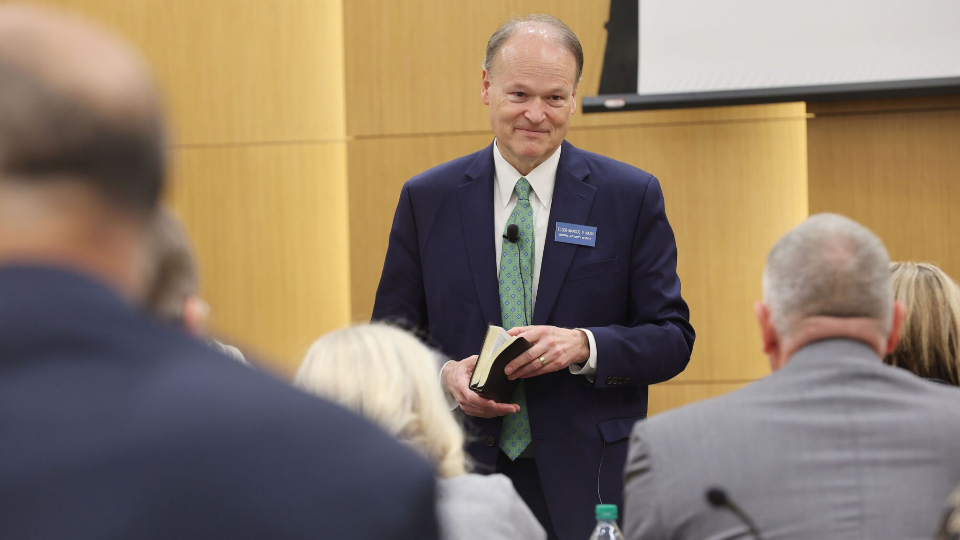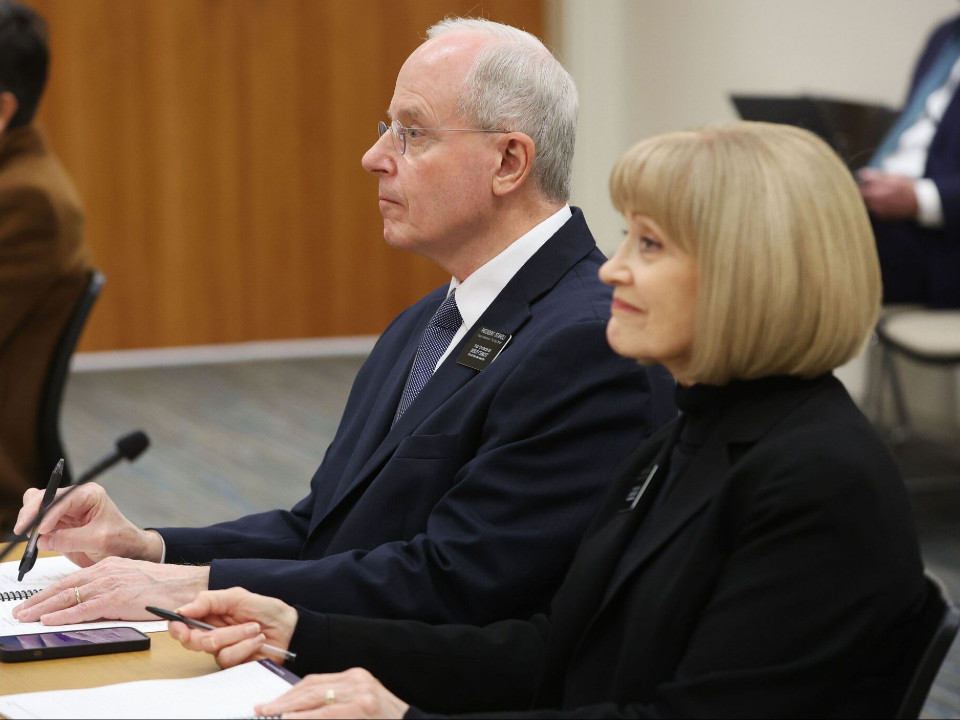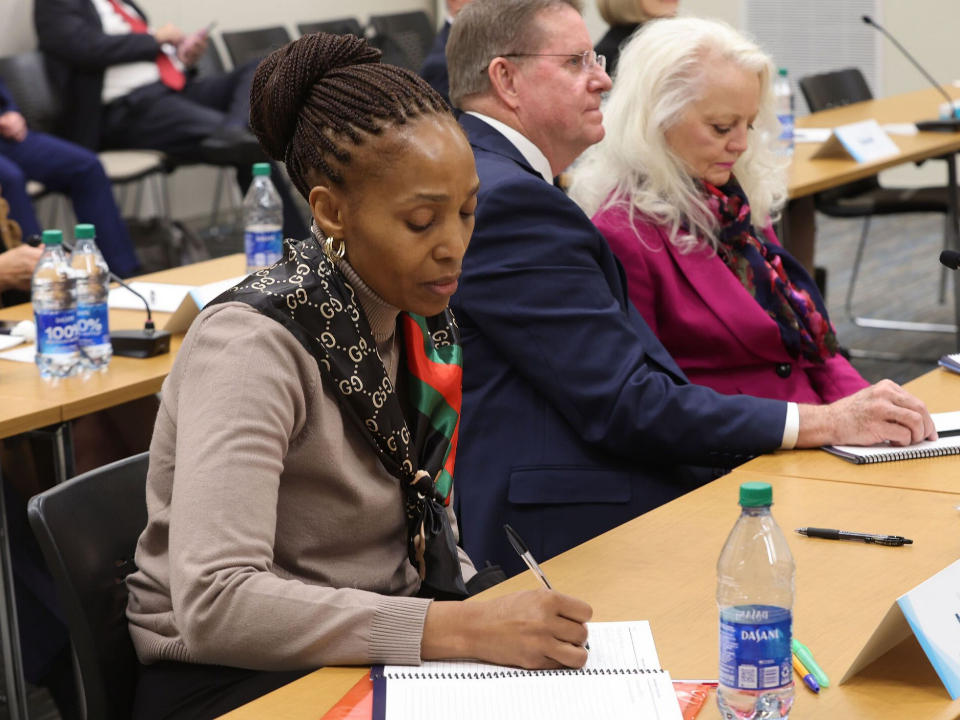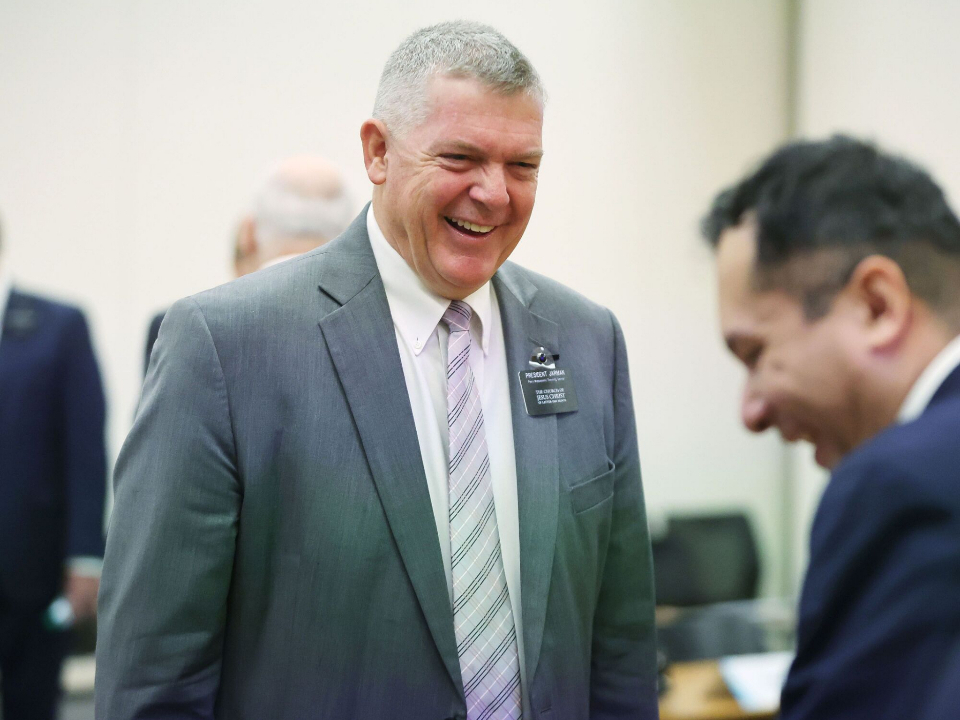- MTC-Training-23
- MTC-leaders-23
- MTC-leaders-23
- MTC-leaders-23
- MTC-leaders-23
- MTC-leaders-23
- MTC-leaders-23
- MTC-leaders-23
- MTC-leaders-23
| Temple Square is always beautiful in the springtime. Gardeners work to prepare the ground for General Conference. © 2012 Intellectual Reserve, Inc. All rights reserved. | 1 / 2 |
This story appears here courtesy of TheChurchNews.com. It is not for use by other media.
By Scott Taylor, Church News
PROVO, Utah
For the first time, all new leaders called to preside over The Church of Jesus Christ of Latter-day Saints’ 10 missionary training centers worldwide gathered at the same time and site before departing to begin their two-year assignments.
During the three-day 2023 Seminar for New MTC leaders January 10-12 at the Provo MTC, the Missionary Department welcomed the 10 couples who will serve as MTC presidents and MTC Relief Society presidents. And sitting beside each couple was the manager of operations at the respective MTC.
But with the COVID-19 pandemic resulting in visa restrictions and travel limitations for not only missionaries but also mission and MTC leaders over the past two-plus years and changing service start and stop dates, it just so happens that all MTC leadership changes are happening in January 2023.
“So this is the first time we’ve had all the MTC leaders together at the same time with the managers all in the same room,” said Kelend Mills, the department’s administrative director of MTCs. “It’s a wonderful opportunity for Elder Nash to really help them understand the vision of what MTCs do.”
And following introductions led by David N. Weidman, the Missionary Department’s managing director, Elder Nash shared that vision in the day’s opening session — the vision of missionary work and missionary training centers.

MTC-leaders-23
Elder Marcus B. Nash, General Authority Seventy and Missionary Department executive director, speaks during the 2023 Seminar for New MTC Leaders in Provo, Utah, on Tuesday, January 10, 2023. Photo by Jeffrey D. Allred, courtesy of Church News.Copyright 2023 Deseret News Publishing Company.
The seminar ran through Thursday, January 12, with Wednesday’s middle-day sessions taking place at Church headquarters for scheduled training and interactions there with members of the Missionary Executive Council, chaired by Elder Quentin L. Cook of the Quorum of the Twelve Apostles and including Elder Gary E. Stevenson of the Twelve.
In addition to Elder Nash, other council members are Elder Paul V. Johnson of the Presidency of the Seventy; Bishop L. Todd Budge, Second Counselor in the Presiding Bishopric; President Bonnie H. Cordon, Young Women General President; and Sister Amy A. Wright, First Counselor in the Primary General Presidency.
Much of the training is being led by members of the executive council and the executive directors of the Missionary Department. Topics range from ecclesiastical and administrative roles to medical and emotional responsibilities and from adjusting to missionary life to lifelong conversion of missionaries.
“MTC presidents and their wives specifically have the responsibility to watch over the missionaries’ spiritual well-being — so their testimonies are grown and being mindful of challenges they may face. They’re watching over individual missionaries and their progress,” Mills said.
“Meanwhile, the MTC managers have the responsibility for the operations of the MTC — the buildings, the food, the finances, the training programs — and so they work very closely together.”

MTC-leaders-23
President Don H. Staheli and Sister Cyndy Staheli, new leaders of the England Missionary Training Center, take notes during the 2023 Seminar for New MTC Leaders in Provo, Utah, on Tuesday, January 10, 2023. Photo by Jeffrey D. Allred, courtesy of Church News.2023 by Intellectual Reserve, Inc. All rights reserved.
A Different Mission Leadership Role
Like all the new MTC leaders, President Don H. Staheli and Sister Cyndy Staheli have previously presided over a mission, with the new England MTC leaders having served in the France Paris Mission.
President Staheli understands the differences in opportunities and experiences between the two mission leadership roles — with time in the MTC to help new missionaries transition from normal, everyday teenage activities into missionary life. Then MTC learnings are implemented in the mission field as transition, growth and conversion continue for the elders and sisters.
“Our job, from my perspective, is to help them feel safe — because they’re all anxious and worried — and then to minister to them to facilitate their conversion and their commitment to full-time missionary service.”
Added Sister Staheli: “I think they need to feel loved — not necessarily just by us but by the Lord and recognize that they have the ability to be a powerful missionary. As we minister to them and try to become more Christlike ourselves, they will follow suit.”
Working Together
President Fernando M. Silva and Sister Monica Silva, the new leaders for the Brazil MTC in São Paulo, Brazil, both were looking for divine direction during the seminar.
“I hope to be in tune with the Spirit,” Sister Silva said, “so I can learn the things that I have to learn to serve the Lord.”
Added President Silva: “I want to feel the Spirit guide me to help the missionaries to become converted to Christ and be great instruments in converting the people in Brazil.”
For the Silvas, being with Brazil MTC manager of operations Mario Dias was a reunion of sorts. When Dias presided over the Brazil Teresina Mission 13 years ago, President Silva was his first contact in the Missionary Department as an in-field representative.
“I think we can keep this feeling of unity in Christ together,” Dias said of the renewed associations. “We are experiencing some extreme spiritual experiences here together, and this is a way to help us receive revelation to know how to help missionaries in Brazil.”

MTC-leaders-23
Tshepiso Mqadi, South Africa Missionary Training Center manager of operations, takes notes during the 2023 Seminar for New MTC Leaders in Provo, Utah, on Tuesday, January 10, 2023. Photo by Jeffrey D. Allred, courtesy of Church News.Copyright 2023 Deseret News Publishing Company.
Revisiting the Seminar
With the seminar being held on the campus where they have served the past two years, outgoing Provo MTC President Benson L. Porter and Sister Kerry Porter reflected on their own seminar experiences and feelings.
“As we drove in this morning, we asked, ‘Do you remember how we felt coming in that day?’ We felt overwhelmed,” recalled Sister Porter.
Her husband continued: “We felt like that seminar was a charter from the Lord, and that’s what we’ve lived by for the past two years — that and the setting apart.”
The Porters were set apart for their MTC calls by Elder Dieter F. Uchtdorf of the Quorum of the Twelve Apostles on the third day of the 2021 seminar.
“And so, it was all this information from the seminar — all you need to do, which sometimes can seem overwhelming,” President Porter said. “But the setting apart was basically bringing it all together, to say ‘You can do this, this is what the Lord needs you to do here specifically.’”

MTC-leaders-23
President Mark A. Jarman, newly called to the Peru Missionary Training Center, laughs prior to the 2023 Seminar for New MTC Leaders in Provo, Utah, on Tuesday, January 10, 2023. Photo by Jeffrey D. Allred, courtesy of Church News.Copyright 2023 Deseret News Publishing Company.
New MTC Leaders
Attending the 2023 Seminar for New MTC Leaders were the following, with the respective manager of operations included:
Brazil Missionary Training Center, in São Paulo, Brazil: President Fernando M. Silva and Sister Monica Silva; Mario Dias
England Missionary Training Center, in Preston, England: President Don H. Staheli and Sister Cyndy Staheli; Christopher Pattenden
Ghana Missionary Training Center in Accra, Ghana: President Mark O. Lords and Sister Gwen Lords; Patrick Appianti
India Service Support Center, in Hyderabad, India: President Bruce W Chesnut and Sister Tamara B. Chesnut; Christopher Pattenden
Mexico Missionary Training Center, in Mexico City, Mexico: President Robert W. Hymas and Sister Katherine Ann Hymas; Nicolas Castañeda
New Zealand Missionary Training Center, in Auckland, New Zealand: President Charles A. Rudd and Sister Annette L. Rudd; Timena Gasu
Peru Missionary Training Center, in Lima, Peru: President Mark A. Jarman and Sister Sylvia Ruth Jarman; Julian Palacio
Philippines Missionary Training Center, in Manila, Philippines: President David W. DeLaMare and Sister Kayla DeLaMare; Jovanne Lopez
Provo Missionary Training Center, in Provo, Utah: President Kevin E. Calderwood and Sister Sydnee Calderwood; Kelend Mills
South Africa Missionary Training Center, in Johannesburg, South Africa: President Mark J. Pendleton and Sister JoAnn Pendleton; Tshepiso Mqadi
“The purpose of this seminar,” said Elder Marcus B. Nash, a General Authority Seventy and Missionary Department executive director, “is to reaffirm the source of the calling for these mission leaders, to enable them by both inspiration and practical instruction to help the missionaries grow spiritually and to deepen their conversion to the Lord Jesus Christ, so that they then in turn can bring light and life to the lives of those to whom they will be sent to in the mission field.”
By Missionary Department projections, these new MTC leaders will collectively help train, transition and influence more than 80,000 new missionaries over their two-year assignments.
In previous years, the annual seminar would bring together new leaders for about half of the MTCs in attendance, staggered with the following seminar for the leaders new that year for the other MTCs.
